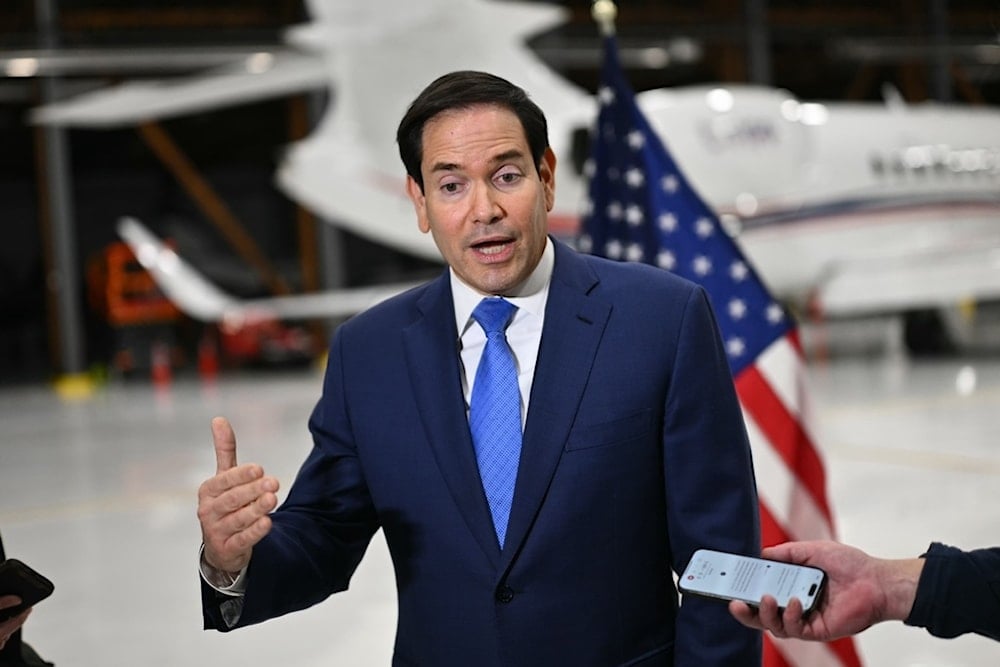Rubio says US has 'run out' of new Russia sanctions
US Secretary of State Marco Rubio warns Washington is running out of sanctions options on Russia, urging Europe to close enforcement gaps.
-

United States Secretary of State Marco Rubio speaks to traveling journalists at the John C. Munro Hamilton International Airport in Hamilton, Ontario, Canada, on November 12, 2025, after the G7 foreign ministers meeting (Pool Photo via AP)
United States Secretary of State Marco Rubio warned reporters as he departed the G7 foreign ministers’ meeting that Washington has substantially exhausted its unilateral sanctions options against Russia, and urged partners to close enforcement gaps that allow Moscow to keep selling energy.
Rubio’s blunt assessment, and his public nudge toward Europe to act on enforcement, underlined growing US frustration with the limited levers left to pressure Russian authorities.
'We’re running out of things to sanction'
Asked about further steps on Russia sanctions, Rubio said, “Well, I don’t know what more there is to do.”
“I mean, we hit their major oil companies,” he added.
“We’re running out of things to sanction in that regard,” the US Secretary of State underlined.
Rubio framed the problem not as a lack of will but as a structural limit, as sanctions can only bite if there are still meaningful economic channels to choke, and many of those channels have already been curtailed by previous US packages.
Shadow fleet: how energy revenues keep flowing
Western efforts to squeeze Russian oil revenues have prompted the rise of a so-called “shadow fleet”, an aggregation of ageing tankers, opaque shipowners, and murky flag registrations that allegedly help Moscow move crude to buyers while avoiding the normal market and regulatory checks.
European and British authorities have increasingly targeted these vessels, sanctioning ships, investigating illicit transfers, and exploring pre-authorized inspections, but the fleet remains large and resilient. Recent reporting and official moves show hundreds of vessels linked to circumvention and repeated efforts by the EU and UK to add more ships to sanction lists and to tighten maritime inspection regimes.
Rubio explicitly tied the enforcement problem to Europe’s proximity and responsibility, saying, “The shadow fleet is an enforcement mechanism, and obviously, sanctions have to be enforced.”
“And shadow fleet has come up because I do think there are things that the Europeans can do on shadow fleets since a lot of these are happening in areas much closer to them,” he told reporters.
That public appeal implicitly acknowledges that energy trade patterns and political costs at home constrain how far European capitals will push to choke all Russian flows.
Read more: Germany placed as NATO’s main bridgehead in potential war with Russia
After Lukoil, little left to sanction in Russia
Earlier this week, Russia's Lukoil declared force majeure at Iraq’s massive West Qurna-2 oilfield after Western sanctions on the Russian oil giant complicated its operations, Reuters reported, citing four sources familiar with the matter. Iraq has suspended all cash and crude payments to Lukoil, three of the sources said, a move that disrupted the company’s revenue flow and created operational challenges at the West Qurna-2 oilfield, ultimately prompting Lukoil to declare force majeure.
Having already hit major players such as Lukoil and Rosneft, and moved to target over 180 vessels associated with the “shadow fleet” of tankers, US policymakers now acknowledge that the remaining sectors are fewer and increasingly difficult to isolate.
Yet, the Russian economy is not simply collapsing under sanctions. Instead, Moscow is actively restructuring its model, pivoting toward deep bilateral energy agreements and building layers of self-sufficiency to offset Western pressure.
For example, Russia has broadened its oil exports to China, with crude shipments hitting 2.17 million barrels per day in the first ten months of 2024 and a share of 19.8 per cent of China’s total crude imports. On the institutional front, Russia continues to lean on frameworks such as OPEC+ and the BRICS grouping to anchor its role in the global energy system despite sanctions. On the field, Russia remains firmly on the offensive in eastern and southern conflict zones.
Over the past week, its forces seized three more settlements in Zaporizhzhia and intensified assaults near Pokrovsk, where fighting has reached a critical stage. According to the Institute for the Study of War, Russian troops captured about 40 km² in a single day, their largest advance since early 2024, while thousands of drone and artillery strikes continue daily across the front.
As Moscow pushes to encircle key supply routes and expand control in Donetsk, Washington faces the stark reality that the battlefield momentum remains in Russia’s favor despite its best attempts at curtailing military efforts via financial pressure.
Read more: Russia's Vostok forces capture Volchye amid heavy Ukrainian losses

 5 Min Read
5 Min Read









